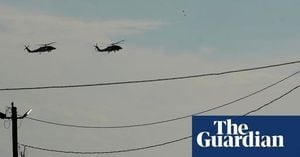On April 7, 2025, Airbus announced a significant order from the Taiwanese airline EVA Air, which has committed to purchasing nine new aircraft. This order includes six long-range A350-1000 jets and three single-aisle A321neo planes. This development marks the fulfillment of a commitment that Airbus had previously hinted at last month. However, the financial specifics of the deal were not disclosed by the company.
In response to this news, Airbus's stock saw a notable decline on the Euronext exchange in Paris, dropping by 10.456 percent to a price of 131.54 euros. This downturn occurred amid a broader trend of declining stock performance across European markets, which have been under pressure recently.
The A350-1000 is particularly renowned for its fuel efficiency and advanced technology, making it a popular choice for airlines looking to enhance their long-haul operations. Meanwhile, the A321neo is favored for its operational efficiency on shorter routes, catering to the growing demand for single-aisle jets in regional markets.
Airbus's recent order from EVA Air comes at a time when the aviation industry is gradually rebounding from the setbacks caused by the COVID-19 pandemic. As international travel resumes, airlines are looking to expand their fleets to meet the increasing passenger demand. EVA Air's decision to order these aircraft reflects a strategic move to modernize its fleet and improve operational efficiency.
Market analysts have noted that while the order is a positive sign for Airbus, the steep drop in its stock price suggests that investors may be reacting to broader economic concerns affecting the aviation sector. "The market is quite volatile right now, and any news can trigger significant price movements," commented a financial analyst from RBC Capital Markets.
Airbus has faced stiff competition from its main rival, Boeing, which has also been working on securing orders from various airlines. This competitive landscape adds pressure on Airbus to deliver on its commitments and maintain its market share.
In the context of the recent order, Airbus has received mixed ratings from various financial analysts. Some analysts have rated the company as 'Outperform,' while others have adopted a more cautious 'Neutral' stance, indicating a divergence of opinions on the company's future performance.
Despite the stock's decline, the order from EVA Air is viewed as a validation of Airbus's product offerings and its ability to attract major airline customers. "This order is a testament to the confidence that airlines have in Airbus's aircraft capabilities," said an industry expert.
As the aviation market continues to evolve, the focus will remain on how Airbus navigates these challenges and capitalizes on new opportunities. The company's ability to adapt and innovate will be crucial as it seeks to recover from the recent stock price decline and build momentum in the coming months.
Overall, the announcement of the EVA Air order is a noteworthy development for Airbus, highlighting the ongoing demand for new aircraft and the strategic decisions airlines are making as they look to the future of air travel.






